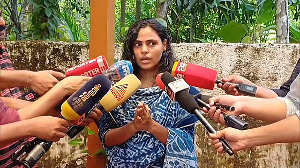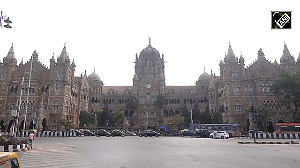While many in India continue to believe it was non-violent struggle ALONE that got us freedom, there is no ambiguity about who and what saved our independence for the last 57 years!
In less than two months after Independence, the country faced its first trial by fire when Pakistan-backed tribals invaded Jammu and Kashmir. That conflict continues to simmer to date. Despite our policy of peace we faced aggression and fought three wars. In all these, the country's armed forces rose to the occasion and defended our freedom. The armed forces have not only defended the country from external enemies but have also been active in times of natural disasters and internal troubles.
In the 2002 Gujarat riots, I was personally told by Mr Ansari (the man made famous by the media as his face was shown around the world, pleading for his life) on August 15 at a function in Pune two years ago that the army's timely arrival saved his life.
The army has always taken great pride in its absolute impartiality while acting internally. Its discipline ensures that people continue to have faith in its good intentions.
As we enter the 58th year of our Independence, the nation is showing signs of menopause. It is time we took a critical look at our institutions on this occasion.
When the scandal of mistreating prisoners by American soldiers in Iraq broke out, many of us, former army men, were a bit smug, and felt this kind of thing could never be done by the Indian Army. A former general, a veteran of World War II, recalled that many times in his career when he was about to commit a rash act, a humble jawan often corrected him, "Sahib, aise nahin hona chahiye (Sir, it should not happen this way)!"
According to the general, the sense of Kshatra Dharma (the Warrior Code) is very strong and that is what has made the Indian Army what it is.
A series of recent incidents ought to serve as a wake-up call to the armed forces, Indian society and the nation at large.
In Kashmir sometime ago, a whole village revolted against the army, accusing it of using civilians as a shield in operations against the terrorists.
The town of Imphal and virtually the whole state of Manipur is in revolt against the alleged rape and killing of a woman by Assam Rifles soldiers. The people have demanded the repeal of the Armed Forces Special Powers Act that gives soldiers the authority to open fire on suspects.
The most striking thing about these incidents -- and also the most alarming -- is that these are not individual aberrations, but incidents that involve a fair number of officers and soldiers.
The real worry is that these incidents may be only the tip of the iceberg.
ARMED FORCES SPECIAL POWERS AND THE PROBLEMS OF FIGHTING INSURGENTS
KASHMIR
The special powers given to the armed forces in disturbed areas have their genesis in the tactical problems faced by the armed forces fighting armed insurgents.
An ambush or attack launched from a concealed position on an unsuspecting body of soldiers is the most effective and favourite tactic of the insurgents. Without the protection of the Special Powers Act, the only options for soldiers are to have a magistrate around to give permission to fire (a magistrate has to accompany the soldiers on patrols and combat missions) or use the right of self defence. In the case of the latter, a soldier has to wait to be shot at!
In light of the fact that the insurgents today are armed with deadly weapons like AK-47s that fire hundreds of bullets per minute, not permitting a soldier to fire first is like sentencing him to death.
As long as the armed insurgents exist, the Special Powers are a must if the soldiers are to act within the law and yet defend themselves. Faced with armed gangsters the police face a similar problem today. The solution to this problem found by the police has been to describe such actions as 'encounters.' The moral corrosion that this constant lie engenders is an issue that society ought to ponder.
In Kashmir the problem is even more complicated. There are two types of violence going on simultaneously in the state.
One is the alienation of the local population and its recourse to violence; militancy as it is called by the media.
The second and deadlier conflict is the proxy war being waged by jihadi outfits from Pakistan with links to international terrorism, an action that enjoys the support of the Pakistani State in varying degrees.
Thus, the soldiers in Kashmir face not just rag-tag guerrilla outfits, but a well armed enemy with sophisticated arms, modern communications and support bases across the border.
To shackle the military with rules and laws suited to civilian society and expecting them to fight with one hand tied behind their backs is an invitation to disaster.
Using Kashmiri civilians as a shield has a long history.
It was the JKLF (the Jammu Kashmir Liberation Front) that pioneered the technique in the early 1990s.
In October 1991, I was an eyewitness to an incident in Srinagar. The deputy leader of the JKLF was cornered in downtown Srinagar. To divert the attention of the troops and obstruct their movements, a sizeable group of burqa-clad women gathered near the Pathari mosque and raised slogans. Suddenly, a hand grenade was hurled at the soldiers. Two soldiers were seriously wounded, one of them died later in hospital. The troops were in a quandary. Opening fire on the crowd of women was an invitation to incitement and disaster. Showing great self control and restraint, the troops did not retaliate. That was in 1991.
Such tactics multiplied several fold in subsequent years. In the late 1990s the Indian Army began the practice of coercing civilians to lead searches when encountering militants in populated areas.
Tomorrow: The soldier's dilemma
Colonel (retired) Dr Anil A Athale is former joint director, War History, at the defence ministry.







 © 2025
© 2025